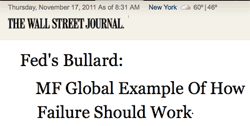I think there is sufficient evidence today to conclude that Re-Hypothecation is at the root of the customer losses at MFG. This Reuters story started the discussion on re-hypothecation. There have been several additional articles on this at Zero Hedge, (link, link) and FTAlphaville (link, link). Let me add one additional bit of info.
The Canadian customers of MFG got their money back within 10 days of the MFG bankruptcy. The accounts that have lost money are either USA or UK based. In Canada, re-hypothecation is not permitted. I got these comments from a Canadian MFG account holder:
The trustee where segregated MF Global Canada customers’ funds were held was RBC Dominion Securities. I don’t think any of these funds ever left the trustee in Canada. Likelihood is if they left, the Canadian government would have made the parent Royal Bank of Canada eat up the losses and make full restitution.
We shall see in the coming weeks if, in fact, re-hypothecation is the cause of the problems. I’m convinced it is.
The rules on broker’s ability to A) Hypothecate and B) Re-hypothecate in the USA are spelled out in Reg T. This set of rules has been established by our good friends at the Federal Reserve Bank. Let me provide some telling words on this re Reg. T rule 15c3-3: (emphasis mine/Link)
• Except as otherwise agreed in writing by the OTC derivatives dealer and the counterparty, the dealer may repledge or otherwise use the collateral in its business;
• In the event of the OTC derivatives dealer’s failure, the counterparty will likely be considered an unsecured creditor of the dealer as to that collateral;
• The Securities Investor Protection Act of 1970 (15 U.S.C. 78aaa et seq.) does not protect the counterparty.
Well there you have it. Reg. T does permit the broker to “repledge” (AKA re-hypothecate). In the event of default by the broker, the counterparty will be considered an unsecured creditor. (AKA customers lose money). And SIPC provides zero protection to account holders in the event of a broker default.
For me, there is sufficient information to conclude that Reg. T is flawed and must be changed. I have to believe there is any army of lawyers over at the Federal Reserve looking into this as I write and they are struggling with what they can do to “fix” the problem.
For sure a fix is required. MFG has not, as yet, morphed into a systemic problem. But we are getting closer by the day. The Fed is aware of this. The risk is that customers start to withdraw funds and assets from other brokers. The deleveraging this would cause would be catastrophic. A significant chunk of the shadow banking system (about $10 trillion) is dependent on the liquidity that is created by hypothecation. (The situation is bigger and more problematic in the UK)
 A month ago Fed governor James Bullard stated on CNBC that the issues with MFG did not constitute a systemic problem. I wrote about this at the time Bullard made those comments. I made a public bet with Bullard (a six pack of beer) that he would be forced to eat his words. I never did hear from him.
A month ago Fed governor James Bullard stated on CNBC that the issues with MFG did not constitute a systemic problem. I wrote about this at the time Bullard made those comments. I made a public bet with Bullard (a six pack of beer) that he would be forced to eat his words. I never did hear from him.
I’m re-doubling the bet this AM. If Reg. T is confirmed to be the source of customer losses at MFG then Reg. T will have to be gutted. The changes will have to take place fairly quickly. The consequences across all markets of these changes could prove to be a devastating blow.
The nice folks at the FRB are having a big meeting this week. Reg. T and MFG will almost certainly be on the agenda. I have to believe all those smart folks at the Fed have figured out that we have a problem. We may well get some announcement on this topic by Friday.
Any changes to Reg. T will have profound effects on global markets. Not only the exchanges/asset prices will be affected, this has the potential to derail the global economy. We are already in a very dangerous liquidity situation. If the Fed is forced to change margin rules, liquidity will dry up for an extended period of time. Forced changes in Reg. T will prove to be a Black Swan event.
Note:
Should we get a confirmation of the foregoing discussion and the Fed is forced to react and make regulatory changes, there will be significant long term implications for the Fed. The Fed will have to shoulder the blame for the flaws in Reg. T. They will also have to take responsibility for the broader economic consequences that will surely follow those changes.
The possibility exits for the Fed to lose any credibility they may still have in the US and abroad. The completely unregulated Federal Reserve may lose its independence as a result. There are big downsides to significant revisions to margin rules. The upside is that the Fed’s supreme power over the global economy would be finally checked.
Disclaimer: This page contains affiliate links. If you choose to make a purchase after clicking a link, we may receive a commission at no additional cost to you. Thank you for your support!


A note of clarification on your article…you incorrectly state that the trustee for MF Global funds is RBC Dominion Securities. The Trustee is in fact KPMG. On November 14, 2011, the Ontario Superior Court of Justice approved the bulk transfer of certain MF Global Canada client accounts to RBC Dominion Securities. For further information, please visit the KPMG website at http://www.kpmg.ca/mfglobalcanada